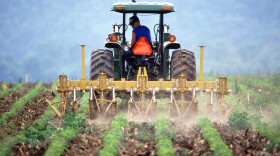
Dana Cronin
Reporter, Illinois NewsroomI cover food, agriculture and environmental issues for Harvest Public Media. I’m based at Illinois Public Media located in Champaign-Urbana, Illinois.
I grew up in the heart of Napa Valley, California — an agricultural region of its own. I studied at Colorado College, where I received a degree in Environmental Science, Journalism and Spanish.
I began my radio reporting career in southern Colorado at member station 91.5 KRCC, where I spent three years writing about everything from agriculture to Colorado’s highest mountain peaks. I then went to work at my hometown station, KQED, in San Francisco. While there, I covered the2017 North Bay Fires. Before landing in Illinois, I also spent two years at NPR’s headquarters in Washington D.C., producing for shows including Weekend Edition and All Things Considered.
If you have story ideas for me or just want to say hi, feel free to reach out via email dcronin@illinois.edu or follow me on Twitter @DanaHCronin.
-
The Supplemental Nutrition Education Program (SNAP-Ed) is funded by the U.S. Department of Agriculture and helps SNAP recipients learn how to eat healthy food on a budget. Its employees complain of wages so low that they themselves qualify for SNAP.
-
The White House Conference on Hunger, Nutrition, and Health is set for Sept. 28. But specifics of the conference, including a detailed schedule and guest list, are fuzzy.
-
The Inflation Reduction Act repeals and replaces part of the American Rescue Plan Act that earmarked $4 billion in debt relief for farmers of color.
-
Farmers can use far less chemical fertilizer — which can be expensive and harmful to the environment — and maintain high crop yields, according to a new study.
-
Agriculture companies are increasingly paying farmers to capture carbon. But some say the newly budding carbon marketplace isn’t enough to fight climate change.
-
The American Rescue Plan promised $4 billion in debt relief to “socially disadvantaged farmers.” But a swarm of lawsuits from banks and white farmers alleging discrimination has put the aid on hold.
-
The invasive fish species known as Asian carp now goes by “copi,” in an effort to get more of them out of Midwestern waterways and onto the dinner table.
-
For the first time, researchers have assigned a value to the Black-owned farmland lost over the past century.
-
The 1913 CASE 30-60 is one of just five that still exist, making the model highly sought after by antique tractor enthusiasts.
-
Two Illinois farmers set out to improve soil health in the Midwest. The program they founded also has a myriad of climate benefits.










